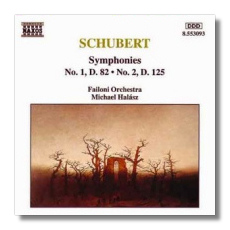
The Internet's Premier Classical Music Source
Related Links
- Schubert Reviews
- Latest Reviews
- More Reviews
-
By Composer
-
Collections
DVD & Blu-ray
Books
Concert Reviews
Articles/Interviews
Software
Audio
Search Amazon
Recommended Links
Site News
 CD Review
CD Review
Franz Schubert

Symphonies #1 & 2
- Symphony #1 in D Major, D. 82 (1813)
- Symphony #2 in B Flat Major, D. 125 (1815)
Failoni Orchestra/Michael Halász
Naxos 8.553093 1994 DDD 63:05
Schubert's entire symphonic output is derivative – not a surprise in the work of a composer who died at the age of 31. At that age, Beethoven had barely begun to write symphonies and Brahms had not yet mustered the courage to compete with Beethoven's mighty canon (and wouldn't for almost ten more years). If Schubert's "Great C Major" sounds like, and even quotes, Beethoven's 9th, that's only to be expected. In view, however, of the powerful and pervasive influence of Beethoven's musical personality and financial success during Schubert's lifetime, it's astonishing that Schubert was able to make such deeply personal statements in his early symphonies. Compare the early string symphonies of Mendelssohn, one of music's most precocious talents. There's hardly a glimmer of individuality in them, yet Schubert managed to fuse more overtly Haydnesque, Mozartian, and Beethovenian elements (the first movement of the second symphony contains a direct quotation from Beethoven's fifth, which was written about seven years earlier – did Schubert really know it or was this telepathy?) into wholes that were unmistakably his own. While a theme from one of these symphonies could have come from the pen of one of the other composers, its harmonic, rhythmic, and orchestral context could have been drawn directly from one of Schubert's most mature orchestral works. For those who know Schubert's later symphonies best (from the fourth on), the earliest efforts will be a revelation.
The great composers evoke very different responses. To Bach, a common response is absorption; to Mozart, admiration; to Beethoven, awe; to Brahms, respect; but to Schubert, affection. There's enough warmth in any single measure of Schubert's oeuvre to melt the polar ice caps. To be successful, accordingly, a performance of Schubert must be a good conductor of heat. Judged by this standard, Michael Halász's readings of the first two Schubert symphonies are successful, atmospheric if not numinous.
Interpretations on a smaller emotional scale such as these might not suit the sweetest or most monumental moments of Schubert's later symphonies, but they're perfectly appropriate here. The orchestra plays well, with only a few questionable moments of woodwind ensemble and intonation. The recording is fine, with exceptional dynamic range. This is a most welcome addition to Naxos' catalog. Every Schubertian should buy it – and everyone should be a Schubertian.
Copyright © 1996, Robert Maxham


















